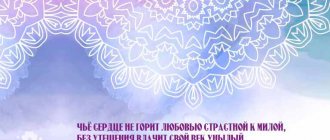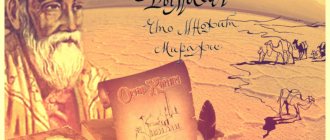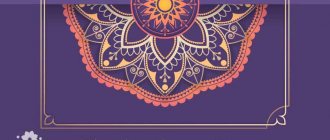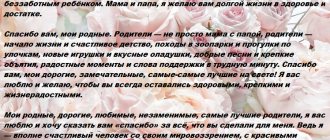Rubai. Poetry. Quotes. Aphorisms.
A collection of the best rubai and poems of the great Persian sage Omar Khayyam. Quotes, aphorisms, sayings. Video “Wisdom of Life” 1 - 9, the text is read by E. Mataev and S. Chonishvili.
Wisdom of life 1. Text. Video. Wisdom of life 2. Text. Video. Wisdom of life 3. Text. Video. Wisdom of life 4. Text. Video. Wisdom of life 5. Text. Video. Wisdom of life 6. Text. Video. Wisdom of life 7. Text. Video. Wisdom of life 8. Text. Video. Wisdom of life 9. Text. Video. Rubai. Poetry. Quotes. Aphorisms. Rubai about love. Omar Khayyam Rubaiyat. Gold fund. Translation by I. A. Golubev. All Rubai translation by Irina Evsa “The Soothsayer Omar Khayyam”.
Hood. Movie. Episodes 1-8.) Dirt is dust with water. And this is my flesh! I am floundering, drowning in the temptations of the flesh. If only I had sculpted myself more skillfully, But I came out like this on the ingot of Being.
Omar Khayyam - Iranian scientist, poet and sage was born in Nishapur around 1048. Absolute name - Giyasaddin Abul-Fath Omar ibn Ibrahim. He received the nickname Khayyam “Tentman” in connection with his father’s specialty. During his time and until relatively recent times, Khayyam was famous mainly as a legendary mathematician, physicist and astronomer. The algebra that Khayyam wrote was translated into French by F. Wepke in 1851. Rubaiyat and quatrains translated by E. Fitzgerald in 1859, first published as rubaiyat, and later translated into French by Nikol Duman in 1867. brought Omar Khayyam the fame of a great poet, philosopher and singer. The works of many scientists, based on rich original material, confirm the historical discoveries of Omar Khayyam as a torch, who did a lot for such sciences as astronomy, mathematics and physics. For example, Khayyam’s mathematical research is of invaluable importance even today and has been translated into many languages. The works of Omar Khayyam were studied some time later by the world mathematician Nasreddin Tusi and in his works reached the scientists of Europe. Khayyam's poetry is an extraordinary phenomenon in the annals of culture around the world. If his creations provided enormous benefits in the evolution of science, then magnificent rubai still conquer the hearts of readers with their maximum capacity, conciseness and simplicity of expressive means. Scientists judge the work of Omar Khayyam differently. Some believe that the lyro-epic creation was for him only entertainment, into which he immersed himself at his leisure. And despite this, Khayyam’s songs and poems, without knowing any time boundaries, survived centuries and reached the present day.
With all his being, Khayyam wanted to transform the world and did everything he could for this: he studied the laws of the universe, fixed his gaze on the starry heavens, delved into the secrets of human essence and helped people get rid of internal slavery. This sage knew that the greatest evil for people is the religious illusion, that religions fetter the human spirit and the power of their mind. Khayyam understood and was aware that when people are freed from these shackles, they will be able to live independently and happily. There are many difficult and incompatible tasks in the works of Omar Khayyam. The scientist, who in science was able to significantly advance ahead of his time, could not in any way understand the laws of mankind. As a result, this noble old man, who saw many hardships in life, which over and over again destroyed his lofty dreams, who endured an enormous number of tragic circumstances, in a number of his poems gives place to fatalism, warns of the inevitability of fate and even plunges into doom. Despite this, in Khayyam’s songs, in which a pessimistic motive can be seen, the subtext shows an ardent love for real life and a protest against its injustice. Khayyam’s poetry is another confirmation that the spiritual development of man will never stop. The literary heritage of Omar Khayyam was intended and will serve people, being a colorful milestone in the history and culture of all peoples of the world.
Omar Khayyam's birthday
2. The lower a person’s soul, the higher his nose turns up. He reaches with his nose to where his soul is - he has not matured.
*
3. He who is beaten by life will achieve more. He who eats a pound of salt appreciates honey more. He who shed tears laughs sincerely. He who died knows that he lives!
*
4. Two people were looking through the same window. One saw rain and mud. Another green elm foliage, spring and blue sky. Two people were looking out the same window.
*
9. I think it’s better to be lonely than to give the heat of your soul to “someone”. Having given a priceless gift to just anyone, having met your loved one, you will not be able to love.
*
For the birthday of Omar Khayyam: TOP wise quotes from the philosopher
In addition, Omar made a major contribution to algebra by constructing a classification of cubic equations and solving them using conic sections.
*
We bring to your attention the TOP best quotes from the outstanding philosopher about friendship, life, envy and wealth.
*
1. To be beautiful does not mean to be born with it, because we can learn beauty. When a person is beautiful in soul - What appearance can compare with it?
*
4. Two people were looking through the same window. One saw rain and mud. Another green elm foliage, spring and blue sky. Two people were looking out the same window.
*
8. Don’t trust someone who speaks beautifully; there is always a game in his words. Trust the one who silently does beautiful things.
*
10. The lower a person’s soul, the higher his nose turns up. He reaches with his nose to where his soul has not grown.
*
Wise words of Omar Khayyam on why youth will inevitably disappear. And it's not scary
When we are young, few of us think about how quickly time flies. Only with age do you begin to notice its progress. The theme of the decline of youth and the onset of old age has worried philosophers around the world at all times.
The rubai of the eastern sage, scientist and poet Omar Khayyam about old age is a separate layer of his multifaceted creativity. Some of them are permeated with the bitterness of the unfulfilled and even despair. Others - with light sadness and philosophy, humility before fate. There are also those who are quite optimistic and encourage us to appreciate every moment and even in deep old age to look for everyday joys and be grateful to life.
We analyze three poetic aphorisms of Omar Khayyam about what you cannot return, as well as how to accept your new life and enjoy it even when this seems impossible to many.
I drink bitterness instead of joy slowly...
Everything is gone forever - youth, dexterity, friends... Instead of joy, I slowly drink bitterness. My body, which was like an arrow, is bent like a bow, Only the staff straightens me a little.
This quatrain says that youth is gone forever and there is no way to get it back. The author does not even think about it, but simply states a fact. The rubaiyat lacks any reflection, philosophical reflection or analysis. The sage does not ask rhetorical questions. He just humbly accepts his share.
Joy gives way to bitterness, your body ages and bends like a bow under the weight of past years, and friends who witnessed your cheerful youth leave before your eyes. This cannot be changed.
There is probably no philosopher or thinker who would not address in his works the topic of human decline. And many of them came to the same conclusion: Man is not God. He is mortal. And the only thing he can do is just accept it.
The English writer Somerset Maugham talked about old age like this: “Old age has its pleasures, no less than the pleasures of youth. Old age finds satisfaction in its own perfection. She threw off the shackles of selfishness. The soul, having finally become free, rejoices in the fleeting moment.”
Omar Khayyam agrees with this. This is exactly what his next rubai is about.
The ever more amazing wine of existence...
The closer I am to death, the more I live every day; The more royal the spirit, the poorer my flesh... The more amazing the wine of existence: The more sober I am, the more intoxicated I become.
How often the realization of something important comes to us only after time. We are in a hurry, rushing forward and often do not think about stopping and thinking. And only “on the threshold of death” we understand how important it is to live life to the fullest, not to pay attention to external, superficial things. To be alive.
The famous psychologist and writer Irwin Yalom said: “Death is the condition that gives us the opportunity to live an authentic life.”
Likewise, Omar Khayyam writes that life is felt the brighter the closer the breath of death is felt. The flesh ages, but not the spirit. He, regal, wise from experience, strong, is ready to live, learn, and be surprised by new things. Awareness of this acts like intoxicating wine... But, unfortunately, there is almost no time to enjoy life from the height of the years lived.
However, for the author this is not a reason for regret. This is a reason to take the most joyful moments from life.
Sing until your chang's strings break!
Life is ashamed of those who sit and mourn, Who do not remember joys, do not forgive insults, Sing until the strings of the chang burst! Drink until the vessel is broken on a stone!
The great philosopher of Ancient Greece Epicurus said: “Whoever does not remember his former happiness is already an old man today.”
Omar Khayyam went further and proclaimed: it is necessary not only to remember all the beautiful things that happened in youth, but also in old age to continue to live as if eternity was ahead.
There is no need to accumulate grievances or mourn over a past that cannot be returned. What better way to sing songs, drink wine and indulge in other simple joys of life. And don’t remember bad things.
Perhaps you won’t immediately remember which other philosopher would be so honest. He didn’t glorify old age, didn’t look for advantages, but simply talked about it and death as it was. Like your closest friend, from whom you always expect only the truth, and not flattery or imaginary consolation.
This frankness, and with it the piercing beauty of the rubaiyat lines and their infinite wisdom, make Khayyam’s poetry relevant even now, almost a thousand years after his birth. In the works of this eastern sage, everyone can find answers to their questions.
Comments
11









